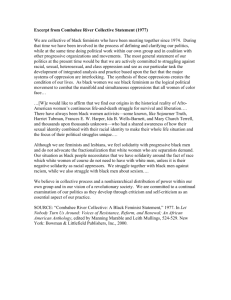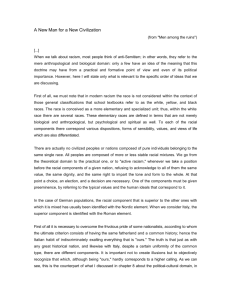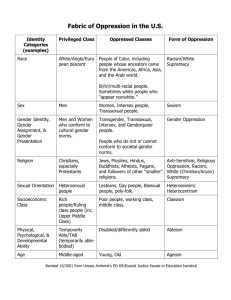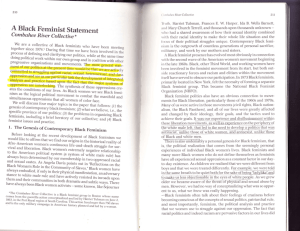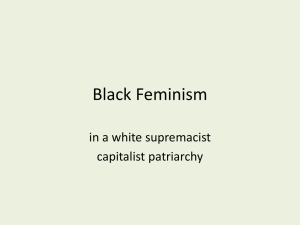The Combahee River Collective Statement
advertisement
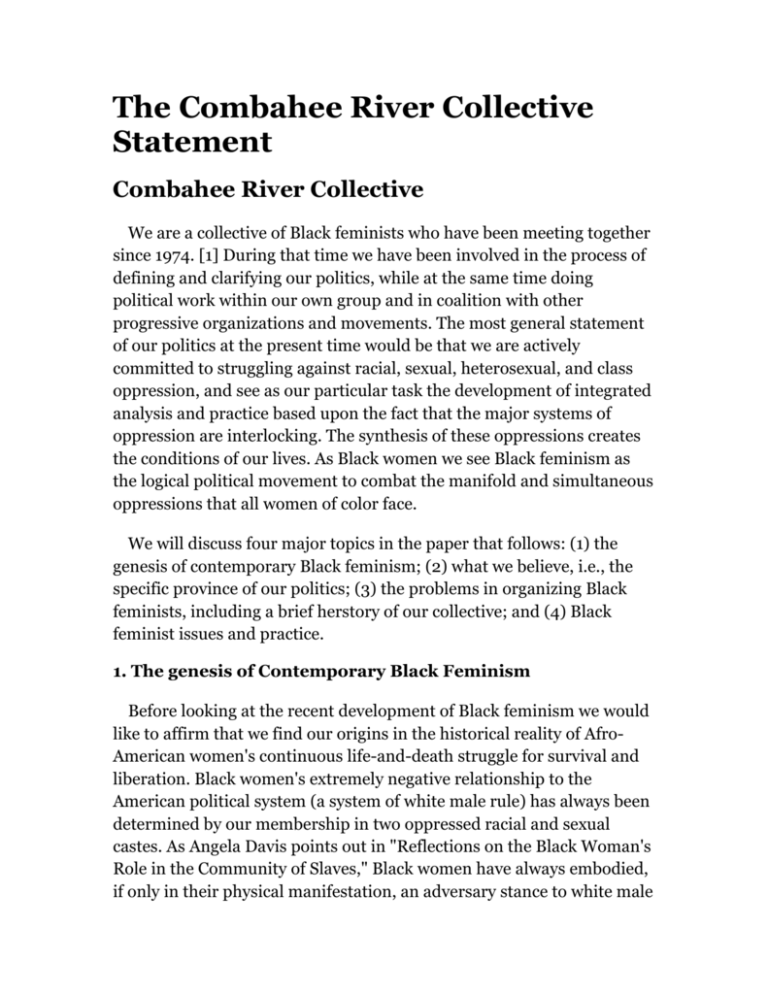
The Combahee River Collective Statement Combahee River Collective We are a collective of Black feminists who have been meeting together since 1974. [1] During that time we have been involved in the process of defining and clarifying our politics, while at the same time doing political work within our own group and in coalition with other progressive organizations and movements. The most general statement of our politics at the present time would be that we are actively committed to struggling against racial, sexual, heterosexual, and class oppression, and see as our particular task the development of integrated analysis and practice based upon the fact that the major systems of oppression are interlocking. The synthesis of these oppressions creates the conditions of our lives. As Black women we see Black feminism as the logical political movement to combat the manifold and simultaneous oppressions that all women of color face. We will discuss four major topics in the paper that follows: (1) the genesis of contemporary Black feminism; (2) what we believe, i.e., the specific province of our politics; (3) the problems in organizing Black feminists, including a brief herstory of our collective; and (4) Black feminist issues and practice. 1. The genesis of Contemporary Black Feminism Before looking at the recent development of Black feminism we would like to affirm that we find our origins in the historical reality of AfroAmerican women's continuous life-and-death struggle for survival and liberation. Black women's extremely negative relationship to the American political system (a system of white male rule) has always been determined by our membership in two oppressed racial and sexual castes. As Angela Davis points out in "Reflections on the Black Woman's Role in the Community of Slaves," Black women have always embodied, if only in their physical manifestation, an adversary stance to white male rule and have actively resisted its inroads upon them and their communities in both dramatic and subtle ways. There have always been Black women activists—some known, like Sojourner Truth, Harriet Tubman, Frances E. W. Harper, Ida B. Wells Barnett, and Mary Church Terrell, and thousands upon thousands unknown—who have had a shared awareness of how their sexual identity combined with their racial identity to make their whole life situation and the focus of their political struggles unique. Contemporary Black feminism is the outgrowth of countless generations of personal sacrifice, militancy, and work by our mothers and sisters. A Black feminist presence has evolved most obviously in connection with the second wave of the American women's movement beginning in the late 1960s. Black, other Third World, and working women have been involved in the feminist movement from its start, but both outside reactionary forces and racism and elitism within the movement itself have served to obscure our participation. In 1973, Black feminists, primarily located in New York, felt the necessity of forming a separate Black feminist group. This became the National Black Feminist Organization (NBFO). Black feminist politics also have an obvious connection to movements for Black liberation, particularly those of the 1960s and I970s. Many of us were active in those movements (Civil Rights, Black nationalism, the Black Panthers), and all of our lives Were greatly affected and changed by their ideologies, their goals, and the tactics used to achieve their goals. It was our experience and disillusionment within these liberation movements, as well as experience on the periphery of the white male left, that led to the need to develop a politics that was anti-racist, unlike those of white women, and anti-sexist, unlike those of Black and white men. There is also undeniably a personal genesis for Black Feminism, that is, the political realization that comes from the seemingly personal experiences of individual Black women's lives. Black feminists and many more Black women who do not define themselves as feminists have all experienced sexual oppression as a constant factor in our day-to-day existence. As children we realized that we were different from boys and that we were treated differently. For example, we were told in the same breath to be quiet both for the sake of being "ladylike" and to make us less objectionable in the eyes of white people. As we grew older we became aware of the threat of physical and sexual abuse by men. However, we had no way of conceptualizing what was so apparent to us, what we knew was really happening. Black feminists often talk about their feelings of craziness before becoming conscious of the concepts of sexual politics, patriarchal rule, and most importantly, feminism, the political analysis and practice that we women use to struggle against our oppression. The fact that racial politics and indeed racism are pervasive factors in our lives did not allow us, and still does not allow most Black women, to look more deeply into our own experiences and, from that sharing and growing consciousness, to build a politics that will change our lives and inevitably end our oppression. Our development must also be tied to the contemporary economic and political position of Black people. The post World War II generation of Black youth was the first to be able to minimally partake of certain educational and employment options, previously closed completely to Black people. Although our economic position is still at the very bottom of the American capitalistic economy, a handful of us have been able to gain certain tools as a result of tokenism in education and employment which potentially enable us to more effectively fight our oppression. A combined anti-racist and anti-sexist position drew us together initially, and as we developed politically we addressed ourselves to heterosexism and economic oppression under capItalism. 2. What We Believe Above all else, Our politics initially sprang from the shared belief that Black women are inherently valuable, that our liberation is a necessity not as an adjunct to somebody else's may because of our need as human persons for autonomy. This may seem so obvious as to sound simplistic, but it is apparent that no other ostensibly progressive movement has ever consIdered our specific oppression as a priority or worked seriously for the ending of that oppression. Merely naming the pejorative stereotypes attributed to Black women (e.g. mammy, matriarch, Sapphire, whore, bulldagger), let alone cataloguing the cruel, often murderous, treatment we receive, Indicates how little value has been placed upon our lives during four centuries of bondage in the Western hemisphere. We realize that the only people who care enough about us to work consistently for our liberation are us. Our politics evolve from a healthy love for ourselves, our sisters and our community which allows us to continue our struggle and work. This focusing upon our own oppression is embodied in the concept of identity politics. We believe that the most profound and potentially most radical politics come directly out of our own identity, as opposed to working to end somebody else's oppression. In the case of Black women this is a particularly repugnant, dangerous, threatening, and therefore revolutionary concept because it is obvious from looking at all the political movements that have preceded us that anyone is more worthy of liberation than ourselves. We reject pedestals, queenhood, and walking ten paces behind. To be recognized as human, levelly human, is enough. We believe that sexual politics under patriarchy is as pervasive in Black women's lives as are the politics of class and race. We also often find it difficult to separate race from class from sex oppression because in our lives they are most often experienced simultaneously. We know that there is such a thing as racial-sexual oppression which is neither solely racial nor solely sexual, e.g., the history of rape of Black women by white men as a weapon of political repression. Although we are feminists and Lesbians, we feel solidarity with progressive Black men and do not advocate the fractionalization that white women who are separatists demand. Our situation as Black people necessitates that we have solidarity around the fact of race, which white women of course do not need to have with white men, unless it is their negative solidarity as racial oppressors. We struggle together with Black men against racism, while we also struggle with Black men about sexism. We realize that the liberation of all oppressed peoples necessitates the destruction of the political-economic systems of capitalism and imperialism as well as patriarchy. We are socialists because we believe that work must be organized for the collective benefit of those who do the work and create the products, and not for the profit of the bosses. Material resources must be equally distributed among those who create these resources. We are not convinced, however, that a socialist revolution that is not also a feminist and anti-racist revolution will guarantee our liberation. We have arrived at the necessity for developing an understanding of class relationships that takes into account the specific class position of Black women who are generally marginal in the labor force, while at this particular time some of us are temporarily viewed as doubly desirable tokens at white-collar and professional levels. We need to articulate the real class situation of persons who are not merely raceless, sexless workers, but for whom racial and sexual oppression are significant determinants in their working/economic lives. Although we are in essential agreement with Marx's theory as it applied to the very specific economic relationships he analyzed, we know that his analysis must be extended further in order for us to understand our specific economic situation as Black women. A political contribution which we feel we have already made is the expansion of the feminist principle that the personal is political. In our consciousness-raising sessions, for example, we have in many ways gone beyond white women's revelations because we are dealing with the implications of race and class as well as sex. Even our Black women's style of talking/testifying in Black language about what we have experienced has a resonance that is both cultural and political. We have spent a great deal of energy delving into the cultural and experiential nature of our oppression out of necessity because none of these matters has ever been looked at before. No one before has ever examined the multilayered texture of Black women's lives. An example of this kind of revelation/conceptualization occurred at a meeting as we discussed the ways in which our early intellectual interests had been attacked by our peers, particularly Black males. We discovered that all of us, because we were "smart" had also been considered "ugly," i.e., "smart-ugly." "Smartugly" crystallized the way in which most of us had been forced to develop our intellects at great cost to our "social" lives. The sanctions In the Black and white communities against Black women thinkers is comparatively much higher than for white women, particularly ones from the educated middle and upper classes. As we have already stated, we reject the stance of Lesbian separatism because it is not a viable political analysis or strategy for us. It leaves out far too much and far too many people, particularly Black men, women, and children. We have a great deal of criticism and loathing for what men have been socialized to be in this society: what they support, how they act, and how they oppress. But we do not have the misguided notion that it is their maleness, per se—i.e., their biological maleness— that makes them what they are. As BIack women we find any type of biological determinism a particularly dangerous and reactionary basis upon which to build a politic. We must also question whether Lesbian separatism is an adequate and progressive political analysis and strategy, even for those who practice it, since it so completely denies any but the sexual sources of women's oppression, negating the facts of class and race. 3. Problems in Organizing Black Feminists During our years together as a Black feminist collective we have experienced success and defeat, joy and pain, victory and failure. We have found that it is very difficult to organize around Black feminist issues, difficult even to announce in certain contexts that we are Black feminists. We have tried to think about the reasons for our difficulties, particularly since the white women's movement continues to be strong and to grow in many directions. In this section we will discuss some of the general reasons for the organizing problems we face and also talk specifically about the stages in organizing our own collective. The major source of difficulty in our political work is that we are not just trying to fight oppression on one front or even two, but instead to address a whole range of oppressions. We do not have racial, sexual, heterosexual, or class privilege to rely upon, nor do we have even the minimal access to resources and power that groups who possess anyone of these types of privilege have. The psychological toll of being a Black woman and the difficulties this presents in reaching political consciousness and doing political work can never be underestimated. There is a very low value placed upon Black women's psyches in this society, which is both racist and sexist. As an early group member once said, "We are all damaged people merely by virtue of being Black women." We are dispossessed psychologically and on every other level, and yet we feel the necessity to struggle to change the condition of all Black women. In "A Black Feminist's Search for Sisterhood," Michele Wallace arrives at this conclusion: We exists as women who are Black who are feminists, each stranded for the moment, working independently because there is not yet an environment in this society remotely congenial to our struggle—because, being on the bottom, we would have to do what no one else has done: we would have to fight the world. [2] Wallace is pessimistic but realistic in her assessment of Black feminists' position, particularly in her allusion to the nearly classic isolation most of us face. We might use our position at the bottom, however, to make a clear leap into revolutionary action. If Black women were free, it would mean that everyone else would have to be free since our freedom would necessitate the destruction of all the systems of oppression. Feminism is, nevertheless, very threatening to the majority of Black people because it calls into question some of the most basic assumptions about our existence, i.e., that sex should be a determinant of power relationships. Here is the way male and female roles were defined in a Black nationalist pamphlet from the early 1970s: We understand that it is and has been traditional that the man is the head of the house. He is the leader of the house/nation because his knowledge of the world is broader, his awareness is greater, his understanding is fuller and his application of this information is wiser... After all, it is only reasonable that the man be the head of the house because he is able to defend and protect the development of his home... Women cannot do the same things as men—they are made by nature to function differently. Equality of men and women is something that cannot happen even in the abstract world. Men are not equal to other men, i.e. ability, experience or even understanding. The value of men and women can be seen as in the value of gold and silver—they are not equal but both have great value. We must realize that men and women are a complement to each other because there is no house/family without a man and his wife. Both are essential to the development of any life. [3] The material conditions of most Black women would hardly lead them to upset both economic and sexual arrangements that seem to represent some stability in their lives. Many Black women have a good understanding of both sexism and racism, but because of the everyday constrictions of their lives, cannot risk struggling against them both. The reaction of Black men to feminism has been notoriously negative. They are, of course, even more threatened than Black women by the possibility that Black feminists might organize around our own needs. They realize that they might not only lose valuable and hardworking allies in their struggles but that they might also be forced to change their habitually sexist ways of interacting with and oppressing Black women. Accusations that Black feminism divides the Black struggle are powerful deterrents to the growth of an autonomous Black women's movement. Still, hundreds of women have been active at different times during the three-year existence of our group. And every Black woman who came, came out of a strongly-felt need for some level of possibility that did not previously exist in her life. When we first started meeting early in 1974 after the NBFO first eastern regional conference, we did not have a strategy for organizing, or even a focus. We just wanted to see what we had. After a period of months of not meeting, we began to meet again late in the year and started doing an intense variety of consciousness-raising. The overwhelming feeling that we had is that after years and years we had finally found each other. Although we were not doing political work as a group, individuals continued their involvement in Lesbian politics, sterilization abuse and abortion rights work, Third World Women's International Women's Day activities, and support activity for the trials of Dr. Kenneth Edelin, Joan Little, and Inéz García. During our first summer when membership had dropped off considerably, those of us remaining devoted serious discussion to the possibility of opening a refuge for battered women in a Black community. (There was no refuge in Boston at that time.) We also decided around that time to become an independent collective since we had serious disagreements with NBFO's bourgeois-feminist stance and their lack of a clear politIcal focus. We also were contacted at that time by socialist feminists, with whom we had worked on abortion rights activities, who wanted to encourage us to attend the National Socialist Feminist Conference in Yellow Springs. One of our members did attend and despite the narrowness of the ideology that was promoted at that particular conference, we became more aware of the need for us to understand our own economic situation and to make our own economic analysis. In the fall, when some members returned, we experienced several months of comparative inactivity and internal disagreements which were first conceptualized as a Lesbian-straight split but which were also the result of class and political differences. During the summer those of us who were still meeting had determined the need to do political work and to move beyond consciousness-raising and serving exclusively as an emotional support group. At the beginning of 1976, when some of the women who had not wanted to do political work and who also had voiced disagreements stopped attending of their own accord, we again looked for a focus. We decided at that time, with the addition of new members, to become a study group. We had always shared our reading with each other, and some of us had written papers on Black feminism for group discussion a few months before this decision was made. We began functioning as a study group and also began discussing the possibility of starting a Black feminist publication. We had a retreat in the late spring which provided a time for both political discussion and working out interpersonal issues. Currently we are planning to gather together a collectIon of Black feminist writing. We feel that it is absolutely essential to demonstrate the reality of our politics to other Black women and believe that we can do this through writing and distributing our work. The fact that individual Black feminists are living in isolation all over the country, that our own numbers are small, and that we have some skills in writing, printing, and publishing makes us want to carry out these kinds of projects as a means of organizing Black feminists as we continue to do political work in coalition with other groups. 4. Black Feminist Issues and Projects During our time together we have identified and worked on many issues of particular relevance to Black women. The inclusiveness of our politics makes us concerned with any situation that impinges upon the lives of women, Third World and working people. We are of course particularly committed to working on those struggles in which race, sex, and class are simultaneous factors in oppression. We might, for example, become involved in workplace organizing at a factory that employs Third World women or picket a hospital that is cutting back on already inadequate heath care to a Third World community, or set up a rape crisis center in a Black neighborhood. Organizing around welfare and daycare concerns might also be a focus. The work to be done and the countless issues that this work represents merely reflect the pervasiveness of our oppression. Issues and projects that collective members have actually worked on are sterilization abuse, abortion rights, battered women, rape and health care. We have also done many workshops and educationals on Black feminism on college campuses, at women's conferences, and most recently for high school women. One issue that is of major concern to us and that we have begun to publicly address is racism in the white women's movement. As Black feminists we are made constantly and painfully aware of how little effort white women have made to understand and combat their racism, which requires among other things that they have a more than superficial comprehension of race, color, and Black history and culture. Eliminating racism in the white women's movement is by definition work for white women to do, but we will continue to speak to and demand accountability on this issue. In the practice of our politics we do not believe that the end always justifies the means. Many reactionary and destructive acts have been done in the name of achieving "correct" political goals. As feminists we do not want to mess over people in the name of politics. We believe in collective process and a nonhierarchical distribution of power within our own group and in our vision of a revolutionary society. We are committed to a continual examination of our politics as they develop through criticism and self-criticism as an essential aspect of our practice. In her introduction to Sisterhood is Powerful Robin Morgan writes: I haven't the faintest notion what possible revolutionary role white heterosexual men could fulfill, since they are the very embodiment of reactionary-vested-interestpower. As Black feminists and Lesbians we know that we have a very definite revolutionary task to perform and we are ready for the lifetime of work and struggle before us. [1] This statement is dated April 1977. [2] Wallace, Michele. "A Black Feminist's Search for Sisterhood," The Village Voice, 28 July 1975, pp. 6-7. [3] Mumininas of Committee for Unified Newark, Mwanamke Mwananchi (The Nationalist Woman), Newark, N.J., ©1971, pp. 4-5. THE COMBAHEE RIVER COLLECTIVE: "The Combahee River Collective Statement," copyright © 1978 by Zillah Eisenstein. About the Black Lives Matter Network Black Lives Matter is a chapter-based national organization working for the validity of Black life. We are working to (re)build the Black liberation movement. This is Not a Moment, but a Movement. #BlackLivesMatter was created in 2012 after Trayvon Martin’s murderer, George Zimmerman, was acquitted for his crime, and dead 17-year old Trayvon was post-humously placed on trial for his own murder. Rooted in the experiences of Black people in this country who actively resist our de-humanization, #BlackLivesMatter is a call to action and a response to the virulent anti-Black racism that permeates our society.Black Lives Matter is a unique contribution that goes beyond extrajudicial killings of Black people by police and vigilantes. It goes beyond the narrow nationalism that can be prevalent within Black communities, which merely call on Black people to love Black, live Black and buy Black, keeping straight cis Black men in the front of the movement while our sisters, queer and trans and disabled folk take up roles in the background or not at all. Black Lives Matter affirms the lives of Black queer and trans folks, disabled folks, black-undocumented folks, folks with records, women and all Black lives along the gender spectrum. It centers those that have been marginalized within Black liberation movements. It is a tactic to (re)build the Black liberation movement. What Does #BlackLivesMatter Mean? When we say Black Lives Matter, we are broadening the conversation around state violence to include all of the ways in which Black people are intentionally left powerless at the hands of the state. We are talking about the ways in which Black lives are deprived of our basic human rights and dignity. • How Black poverty and genocide is state violence. • How 2.8 million Black people are locked in cages in this country is state violence. • How Black women bearing the burden of a relentless assault on our children and our families is state violence. • How Black queer and trans folks bear a unique burden from a heteropatriarchal society that disposes of us like garbage and simultaneously fetishizes us and profits off of us, and that is state violence. • How 500,000 Black people in the US are undocumented immigrants and relegated to the shadows. • How Black girls are used as negotiating chips during times of conflict and war. • How Black folks living with disabilities and different abilities bear the burden of state sponsored Darwinian experiments that attempt to squeeze us into boxes of normality defined by white supremacy, and that is state violence. #BlackLivesMatter is working for a world where Black lives are no longer systematically and intentionally targeted for demise. We affirm our contributions to this society, our humanity, and our resilience in the face of deadly oppression. We have put our sweat equity and love for Black people into creating a political project–taking the hashtag off of social media and into the streets. The call for Black lives to matter is a rallying cry for ALL Black lives striving for liberation. The limits of anti-racism by Adolph Reed Jr. Antiracism is a favorite concept on the American left these days. Of course, all good sorts want to be against racism, but what does the word mean exactly? The contemporary discourse of “antiracism” is focused much more on taxonomy than politics. It emphasizes the name by which we should call some strains of inequality—whether they should be broadly recognized as evidence of “racism”— over specifying the mechanisms that produce them or even the steps that can be taken to combat them. And, no, neither “overcoming racism” nor “rejecting whiteness” qualifies as such a step any more than does waiting for the “revolution” or urging God’s heavenly intervention. If organizing a rally against racism seems at present to be a more substantive political act than attending a prayer vigil for world peace, that’s only because contemporary antiracist activists understand themselves to be employing the same tactics and pursuing the same ends as their predecessors in the period of high insurgency in the struggle against racial segregation. This view, however, is mistaken. The postwar activism that reached its crescendo in the South as the “civil rights movement” wasn’t a movement against a generic “racism;” it was specifically and explicitly directed toward full citizenship rights for black Americans and against the system of racial segregation that defined a specific regime of explicitly racial subordination in the South. The 1940s March on Washington Movement was also directed against specific targets, like employment discrimination in defense production. Black Power era and post-Black Power era struggles similarly focused on combating specific inequalities and pursuing specific goals like the effective exercise of voting rights and specific programs of redistribution. Clarity lost Whether or not one considers those goals correct or appropriate, they were clear and strategic in a way that “antiracism” simply is not. Sure, those earlier struggles relied on a discourse of racial justice, but their targets were concrete and strategic. It is only in a period of political demobilization that the historical specificities of those struggles have become smoothed out of sight in a romantic idealism that homogenizes them into timeless abstractions like “the black liberation movement”—an entity that, like Brigadoon, sporadically appears and returns impelled by its own logic. Ironically, as the basis for a politics, antiracism seems to reflect, several generations downstream, the victory of the postwar psychologists in depoliticizing the critique of racial injustice by shifting its focus from the social structures that generate and reproduce racial inequality to an ultimately individual, and ahistorical, domain of “prejudice” or “intolerance.” (No doubt this shift was partly aided by political imperatives associated with the Cold War and domestic anticommunism.) Beryl Satter’s recent book on the racialized political economy of “contract buying” in Chicago in the 1950s and 1960s, Family Properties: Race, Real Estate, and the Exploitation of Black Urban America, is a good illustration of how these processes worked; Robert Self’s book on Oakland since the 1930s, American Babylon, is another. Both make abundantly clear the role of the real estate industry in creating and recreating housing segregation and ghettoization. Tasty bunny All too often, “racism” is the subject of sentences that imply intentional activity or is characterized as an autonomous “force.” In this kind of formulation, “racism,” a conceptual abstraction, is imagined as a material entity. Abstractions can be useful, but they shouldn’t be given independent life. I can appreciate such formulations as transient political rhetoric; hyperbolic claims made in order to draw attention and galvanize opinion against some particular injustice. But as the basis for social interpretation, and particularly interpretation directed toward strategic political action, they are useless. Their principal function is to feel good and tastily righteous in the mouths of those who propound them. People do things that reproduce patterns of racialized inequality, sometimes with self-consciously bigoted motives, sometimes not. Properly speaking, however, “racism” itself doesn’t do anything more than the Easter Bunny does. Yes, racism exists, as a conceptual condensation of practices and ideas that reproduce, or seek to reproduce, hierarchy along lines defined by race. Apostles of antiracism frequently can’t hear this sort of statement, because in their exceedingly simplistic version of the nexus of race and injustice there can be only the Manichean dichotomy of those who admit racism’s existence and those who deny it. There can be only Todd Gitlin (the sociologist and former SDS leader who has become, both fairly and as caricature, the symbol of a “class-first” line) and their own heroic, truth-telling selves, and whoever is not the latter must be the former. Thus the logic of straining to assign guilt by association substitutes for argument. My position is—and I can’t count the number of times I’ve said this bluntly, yet to no avail, in response to those in blissful thrall of the comforting Manicheanism—that of course racism persists, in all the disparate, often unrelated kinds of social relations and “attitudes” that are characteristically lumped together under that rubric, but from the standpoint of trying to figure out how to combaeven what most of us would agree is racial inequality and injustice, that acknowledgement and $2.25 will get me a ride on the subway. It doesn’t lend itself to any particular action except more taxonomic argument about what counts as racism. Do what now? And here’s a practical catch-22. In the logic of antiracism, exposure of the racial element of an instance of wrongdoing will lead to recognition of injustice, which in turn will lead to remedial action—though not much attention seems ever given to how this part is supposed to work. I suspect this is because the exposure part, which feels so righteously yet undemandingly good, is the real focus. But this exposure convinces only those who are already disposed to recognize. Those who aren’t so disposed have multiple layers of obfuscating ideology, mainly forms of victim-blaming, through which to deny that a given disparity stems from racism or for that matter is even unjust. The Simi Valley jury’s reaction to the Rodney King tape, which saw King as perp and the cops as victims, is a classic illustration. So is “underclass” discourse. Victimization by subprime mortgage scams can be, and frequently is, dismissed as the fault of irresponsible poor folks aspiring beyond their means. And there is no shortage of black people in the public eye—Bill Cosby and Oprah Winfrey are two prime examples, as is Barack Obama—who embrace and recycle those narratives of poor black Americans’ wayward behavior and self-destructive habits. And how does a simple narrative of “racism” account for the fact that so many black institutions, including churches and some racial advocacy organizations, and many, many black individuals actively promoted those risky mortgages as making the “American Dream of home ownership” possible for “us”? Sure, there are analogies available—black slave traders, slave snitches, “Uncle Toms” and various race traitors—but those analogies are moral judgments, not explanations. And to mention them only opens up another second-order debate about racial authenticity—about who “really” represents the black community. Even Clarence Thomas sees himself as a proud black man representing the race’s best interests. My point is that it’s more effective politically to challenge the inequality and injustice directly and bypass the debate over whether it should be called “racism.” I do recognize that, partly because of the terms on which the civil rights movement’s victories have been achieved, there is a strong practical imperative for stressing the racially invidious aspects of injustices: they have legal remedies. Race is one of the legal classes protected by anti-discrimination law; poverty, for instance, is not. But this makes identifying “racism” a technical requirement for pursuing certain grievances, not the basis of an overall political strategy for pursuit of racial justice, or, as I believe is a clearer left formulation, racial equality as an essential component of a program of social justice. Anti-Marx I’ve been struck by the level of visceral and vitriolic anti-Marxism I’ve seen from this strain of defenders of antiracism as a politics. It’s not clear to me what drives it because it takes the form of snide dismissals than direct arguments. Moreover, the dismissals typically include empty acknowledgment that “of course we should oppose capitalism,” whatever that might mean. In any event, the tenor of this anti-Marxism is reminiscent of those right-wing discourses, many of which masqueraded as liberal, in which only invoking the word “Marxism” was sufficient to dismiss an opposing argument or position. This anti-Marxism has some curious effects. Leading professional antiracist Tim Wise came to the defense of Obama’s purged green jobs czar Van Jones by dismissing Jones’s “brief stint with a pseudo-Maoist group,” and pointing instead to “his more recent break with such groups and philosophies, in favor of a commitment to eco-friendly, sustainable capitalism.” In fact, Jones was a core member of a revolutionary organization, STORM, that took itself very seriously, almost comically so. And are we to applaud his break with radical politics in favor of a style of capitalism that few actual capitalists embrace? This is the substance of Wise’s defense. This sort of thing only deepens my suspicions about antiracism’s status within the comfort zone of neoliberalism’s discourses of “reform.” More to the point, I suspect as well that this vitriol toward radicalism is rooted partly in the conviction that a left politics based on class analysis and one focused on racial injustice are Manichean alternatives. Devolutions This is also a notion of fairly recent provenance, in part as well another artifact of the terms on which the civil rights victories were consolidated, including the emergence of a fully incorporated black political class in the 1970s and its subsequent evolution. By contrast, examining, for example, the contributions to historian and civil rights activist Rayford Logan’s 1944 volume What the Negro Wants, one sees quite a different picture. Nearly all the contributors— including nominal conservatives—to this collection of analyses from a broad cross section of black scholars and activists asserted in very concrete terms that the struggle for racial justice and the general struggle for social and industrial democracy were more than inseparable, that the victory of the former largely depended on the success of the latter. This was, at the time, barely even a matter for debate: rather, it was the frame of reference for any black mass politics and protest activity. As I suggest above, various pressures of the postwar period—including carrots of success and sticks of intimidation and witch-hunting, as well as the articulation of class tensions within the Civil Rights movement itself—drove an evolution away from this perspective and toward reformulation of the movement’s goals along lines more consonant with postwar, post-New Deal, Cold War liberalism. Thus what the political scientist Preston Smith calls “racial democracy” came gradually to replace social democracy as a political goal—the redress of grievances that could be construed as specifically racial took precedence over the redistribution of wealth, and an individualized psychology replaced notions of reworking the material sphere. This dynamic intensified with the combination of popular demobilization in black politics and emergence of the post-segregation black political class in the 1970s and 1980s. We live under a regime now that is capable simultaneously of including black people and Latinos, even celebrating that inclusion as a fulfillment of democracy, while excluding poor people without a whimper of opposition. Of course, those most visible in the excluded class are disproportionately black and Latino, and that fact gives the lie to the celebration. Or does it really? From the standpoint of a neoliberal ideal of equality, in which classification by race, gender, sexual orientation or any other recognized ascriptive status (that is, status based on what one allegedly is rather than what one does) does not impose explicit, intrinsic or necessary limitations on one’s participation and aspirations in the society, this celebration of inclusion of blacks, Latinos and others is warranted. We’ll be back! But this notion of democracy is inadequate, since it doesn’t begin to address the deep and deepening patterns of inequality and injustice embedded in the ostensibly “neutral” dynamics of American capitalism. What A. Philip Randolph and others—even anticommunists like Roy Wilkins—understood in the 1940s is that what racism meant was that, so long as such dynamics persisted without challenge, black people and other similarly stigmatized populations would be clustered on the bad side of the distribution of costs and benefits. To extrapolate anachronistically to the present, they would have understood that the struggle against racial health disparities, for example, has no real chance of success apart from a struggle to eliminate for-profit health care. These seem really transparent points to me, but maybe that’s just me. I remain curious why the “debate” over antiracism as a politics takes such indirect and evasive forms—like the analogizing and guilt by association, moralistic bombast in lieu of concrete argument—and why it persists in establishing, even often while denying the move, the terms of debate as race vs. class. I’m increasingly convinced that a likely reason is that the race line is itself a class line, one that is entirely consistent with the neoliberal redefinition of equality and democracy. It reflects the social position of those positioned to benefit from the view that the market is a just, effective, or even acceptable system for rewarding talent and virtue and punishing their opposites and that, therefore, removal of “artificial” impediments to its functioning like race and gender will make it even more efficient and just. From this perspective even the “left” antiracist line that we must fight both economic inequality and racial inequality, which seems always in practice to give priority to “fighting racism” (often theorized as a necessary precondition for doing anything else), looks suspiciously like only another version of the evasive “we’ll come back for you” (after we do all the business-friendly stuff) politics that the Democrats have so successfully employed to avoid addressing economic injustice. Adolph Reed Jr. is a professor of political science at the University of Pennsylvania.

